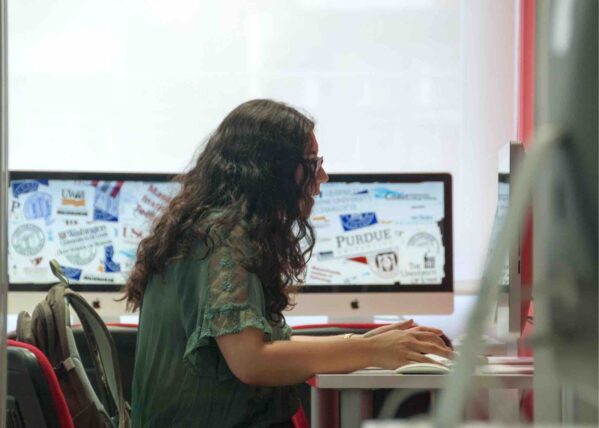
Many students inadvertently spend the first year struggling to adapt to the rigor of college academics and the huge life adjustment to increased independence and responsibility.
To call my first year in college unhappy would be an understatement.
I remember feeling utterly overwhelmed by all the options and somehow, simultaneously, like there was nothing right for me. What club do I join? What classes do I take? What should my major be? Why am I even here?
I was so lost. And it showed.
I hung out with friends who didn’t share my values in a desperate attempt to fit in. I showed up to class but I showed up groggy and half-hearted. I did just enough reading to make it look like I had done it all and I had good grades but I was operating on the absolute bare minimum.
On paper it looks like my first year turned out just fine, but the truth was, I walked away having barely learned anything and feeling more down about myself than ever before. College was supposed to be a time of self-discovery and yet, I felt like I had taken a huge step back in my self-confidence and growth. How could this be?
What I can understand now was that I had no concept of who I authentically was or what I cared about. I only knew how to think about what others wanted me to be. My sense of self and purpose were not developed enough to pursue growth, stick to my values or advocate for my needs. How could I, I had no idea who I was or where I was going, and frankly no one even noticed.
I realize now, this feeling isn’t isolated to just me and my unique experiences.
First-year college students reveal that a majority felt emotionally unprepared for college, with many reporting having a negative experience during their first year. Sixty percent said they wished they had gotten more help with emotional preparation before attending– or at least knew that this would be just as much a factor in success as their academic readiness.
These students were picking up on their need for a critical skill that education researchers have been emphasizing for decades: social and emotional learning (SEL). SEL provides a foundation for safe and positive learning, and enhances students’ ability to succeed in school, careers, and life. Students with demonstrated SEL not only show an increase in academic achievement by an average of 11 percentile points, but also display more prosocial behaviors (such as kindness, sharing, and empathy), improved attitudes toward school, and reduced depression.
While frameworks for SEL are generally comprised of 5 components, the literature has pointed to self-awareness as the most critical aspect of emotional intelligence. Self awareness is both a reflection of SEL and also, is instrumental in students’ capacity to further their SEL.
Self-awareness– which involves understanding our strengths, weaknesses, core values and feelings, as well as an ability to see the effects of our behaviors on others — is critical to managing our emotions and adapting successfully to new experiences.
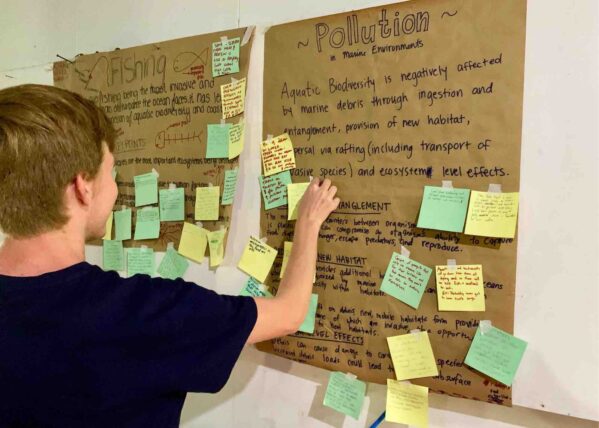
Although academics are clearly a crucial component of college learning, SEL and self-awareness (and taking time to reflect on ourselves and our values) are often underestimated in their ability to lead student outcomes.
The implications of self-awareness are far reaching. Research has shown that self awareness:
- can make us more proactive, boost our acceptance, and encourage positive self-development (Sutton, 2016).
- allows us to see things from the perspective of others, practice self-control, work creatively and productively, and experience pride in ourselves and our work as well as general self-esteem (Silvia & O’Brien, 2004).
- leads to better decision-making (Ridley, Schutz, Glanz, & Weinstein, 1992)
- makes us better at our jobs, better communicators in the workplace, and enhances our job-related wellbeing (Sutton, Williams, & Allinson, 2015).
- as part of emotional intelligence, has a substantial positive connection with academic performance as well as cognitive ability (Petrides, Frederickson, and Furnham, 2004) and is found to be an outstanding predictor of academic excellence in terms of Grade Point Average among undergraduates (Schutte et al 1998).
At Verto, we recognize how critical self-awareness is to student success.
On a typical campus semester, students are left to advocate for themselves and can seek growth opportunities at their own discretion. Whether or not they will experience significant self-development is a total toss up.
Verto flips the switch on this by creating a semester where growth is absolutely guaranteed. Every aspect of Verto programming is designed intentionally so that students cultivate self-awareness and set themselves up for success in college and beyond.
Our curriculum is created to teach, reflect-on, and model self-awareness so that our students become self-aware adult learners who:
- have an independent self-concept;
- can direct their own learning;
- have accumulated a reservoir of life experiences that can be a resource;
- have learning needs closely related to changing social roles;
- are problem-centered and interested in immediate application of knowledge; and
- are internally motivated, rather than externally, to learn.
Rather than jumping in to college blind, as I did and so many other students do, Verto alumni enter their first campus semester with an incredibly advanced sense of self and purpose.
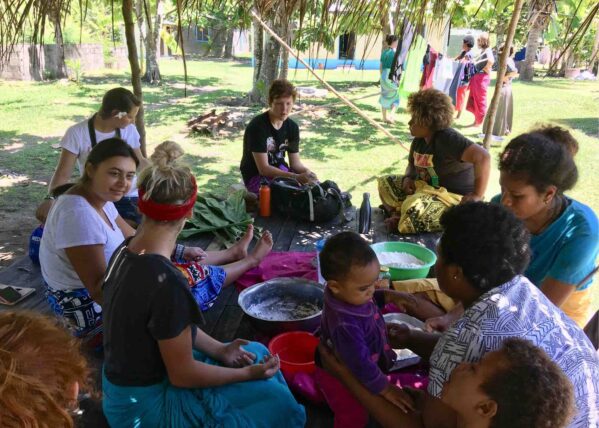
Verto students are part of a community – of peers, locals, program staff, and faculty. Each branch of support offers them unique opportunities to gain perspective and increase their SEL, like these students on the South Pacific semester preparing a meal with their hosts in Fiji.
How do Verto semesters facilitate the development of self-awareness in our students?
Verto students are not left to tackle the lofty goal of developing self-awareness on their own. Our students are immersed in SEL-building best practices and supported around the clock by staff who are there to serve as mentors and coaches.
Through the Verto model where students travel and live alongside their professors, peers, and program leaders, students have infinite opportunities to seek guidance, explore curiosities, and discover how academic content relates to their passions and sense of self.
These informal opportunities for growth are complemented by personal and group counseling with program leaders and academic success coaches who are trained to support student development. Our dedicated staff work with students to identify their strengths and weaknesses and establish tools and learning plans accordingly. In these thoughtful and encouraging conversations, students create better self-knowledge, focus on what they still need to learn, and make adjustments to improve their learning. This new awareness allows students to “experience lessened fear and anxiety and view challenges and seek help with a growth mindset.”
Intentional reflection doesn’t stop at personalized coaching, though; it permeates all aspects of programming and curriculum, from independent introspection through class journal prompts and reflective essays, to collaborative discussion in group workshops. Students are constantly encouraged to understand their learning goals in the context of their own experiences, personal growth and ideal future impact.
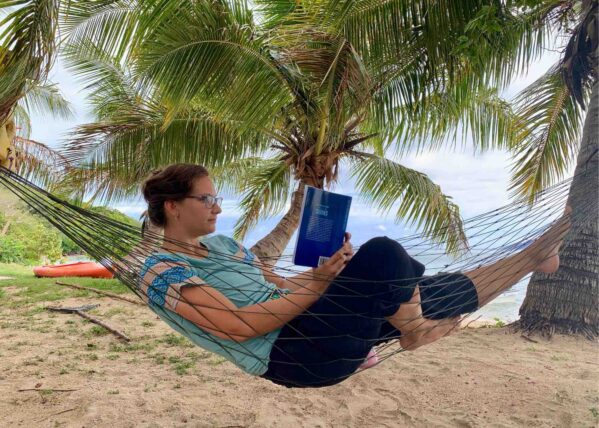
Verto semesters focus on student development on an academic, civic, and personal level, with both inherent and intentional opportunities for introspection to build on self awareness.
While mentorship and reflection are amazing tools for student success and motivation, we’ve seen that the absolute best way to facilitate personal connection and intrinsic motivation is through meaningful connection with individuals and communities. Our students enjoy profound experiences collaborating with a wide variety of people and organizations, allowing them to see diverse perspectives, gain insight into the causes they are most passionate about, and learn about their critical role as global citizens.
With classwork always centered around real communities and real world applications, students realize the broader purpose of their academic efforts and feel more motivated to apply themselves in and out of the classroom. Since their projects rely on teamwork, they gain valuable feedback and new ideas from one another and become more aware of their strengths and weaknesses in relation to those around them.
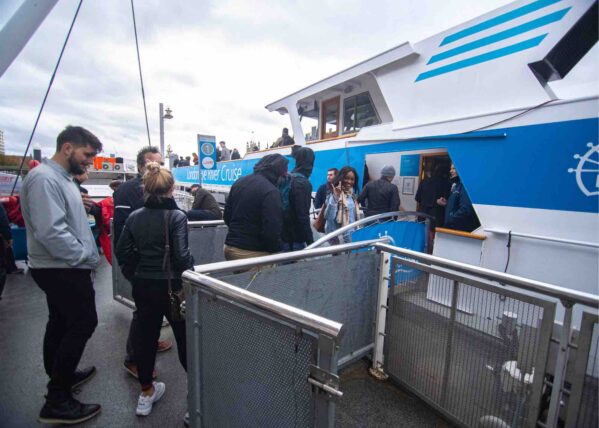
Verto students actively participate in their learning and supplement classroom outcomes with meaningful travel experiences. These can range from a homestay in Fiji to taking a historic and architectural boat tour in London, like these students above.
Immersive cross-cultural learning experiences also help students better understand their own positionality in the world. By comparing and contrasting their own upbringing and culture with those of diverse peers and communities, they can understand how their past experiences inform their present attitudes and see their learning in relation to their identities and social roles.
As our students become more aware of the impacts of their own identities, thoughts and behaviors, they learn to regulate their actions to become better teammates, friends and citizens. And more importantly, they gain invaluable self-knowledge and confidence in the process.
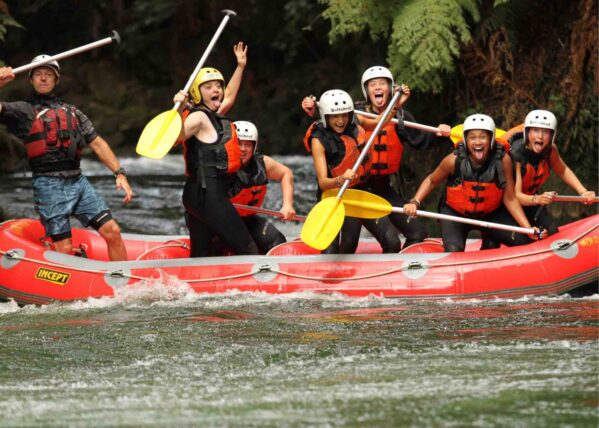
Having fun and unique experiences is part of the power of travel! Students gain perspective, confidence, and independence while traveling, which increases their self awareness and global citizenship. It’s why activities like rafting in Latin America are such a core part of the Verto experience.
Now picture this…
Verto alum Sebastian started his first on-campus semester a couple weeks ago. Sebastian is an adventurous young man with lots of energy, curiosity and flair. He’s interested in pursuing Environmental Studies as his college major, a realization he came to during his Verto semester.
During his South Pacific Verto semester, Sebastian was taken aback when he saw firsthand how much climate change impacts marginalized communities. Ever since then, he’s been experiencing a momentum to learn and make an impact that he’s never had before! He’s become motivated to learn more deeply about sustainability and get involved in environmental organizations. That insight led him to join the campus Fossil Free club where he met friends with similar interests and values who he felt comfortable and psychologically secure with right away.
Sebastian had a hard time staying focused during class in high school, and discovered, when reflecting with his Verto program leader, that he much prefers discussion based classes. He decided to set himself up for success this semester by choosing as many seminar classes as possible. After being so encouraged to share his perspective in his Verto discussions, he’s gained confidence and has been especially eager to participate in his new classes.
Since Sebastian had lots of practice approaching his Verto professors when he had questions, he knew exactly how to advocate for his needs and reach out for help. When he wasn’t understanding a concept in one of his new classes on campus, Sebastian was more than prepared to reach out to his professor. In the past, Sebastian would have been too anxious to ask for help and fine just not getting that concept. But these days, he feels motivated to strive for better academic outcomes because he understands how his studies open doors for him to make an impact in the world.
Although it’s been a challenge adjusting to this new setting, Sebastian has had experience acclimating to foreign environments on his Verto semester and has identified exactly what he needs to do in order to feel good and succeed. His semester is off to a fun and meaningful start. Not to mention he’s even more confident and affirmed in his decision to pursue environmental studies, and even got into his top college choice through our Verto partner college consortium!

